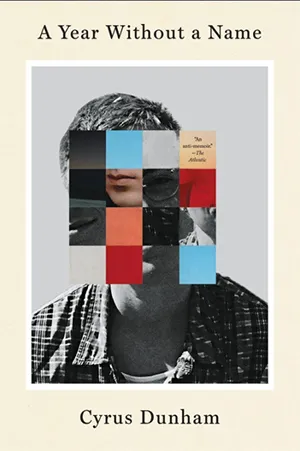This week, the SGN Book Club is reading Cyrus Dunham's highly introspective masterpiece A Year Without a Name. Dunham, who may be most commonly known as the younger sibling of controversial and feminist comedian Lena Dunham, breaks out of his own mind to deliver a raw, poignant, and reflective series of essays written in the year leading up to his official transition.
Rewriting the popular Trans narrative
"Some trans people always know they are trans and never question it," Dunham writes in his introduction. "Others do not know for a long time, question it often, and even change their mind. I have met more of the latter. It is neither the province nor the responsibility of trans people to embody certainty."
He begins his series of essays with a preface written after A Year Without a Name had been originally published. In it, he notes that his book has been lumped in with an anti-Trans book titled Irreversible Damage: The Transgender Craze Seducing Our Daughters. Dunham reflects on his own journey, one that was less marked by a youthful certainty in his male identity and more by a twisting journey of adult self-discovery.
In this brief analysis of social acceptance of Trans identities, Dunham remarks that many "allies" and "feminists" are happy to validate Trans existence, but only when it follows the narrative of the "child born in the wrong body." Despite this, he shows that Trans identities are very nuanced and do not often follow a script.
Like the popular Trans narrative, Dunham describes the all-too-familiar childhood experience of feeling different. He describes feelings of gender dysphoria as a child, and even recalled an instance when he asked his family to call him "Jimmy," which they refused. He also relates his struggles with obsessive compulsive disorder and anxiety, finding comfort in even numbers and hiding away in the deep recesses of his mind to escape the realities of the world.
"When, around the age of five, I began to recognize myself in words, I was afraid of the words that described me being found out. The words were always in my mouth. They felt like a part of me. My parents and their friends cherished me for being a little girl. I knew I was a pervert. I was tricking them," he writes.
As a teenager, Dunham identified as a Lesbian but knew to keep that identity a secret. He talks about growing up the child of feminists and feeling special in his identity as a girl. Despite this, "girl" never felt quite right.

The truth in lies
An underlying parallel to the first half of the book is a life-changing trip Dunham took to India at the beginning of his year without a name. At the time, he was identifying as Nonbinary and struggling to understand how he might fit into the world as a man, simultaneously gaining and losing the privileges he had come to understand how to wield.
"As a teenage girl, I'd stood behind the podium in debate tournaments and wielded language to assert my intellectual superiority," he reflects. "One of the privileges of white girlhood was feeling entitled to prove that I was the best. I was taught to believe that winning would correct for centuries of oppression. Girlhood loomed larger than my own power."
For Dunham, transitioning opened up the fear of becoming the oppressor and inheriting the guilt of a white man, while still living with the experiences and memories of being the oppressed. He struggled with seeing transition as a rejection of his femininity and feared it would make him a misogynist in the eyes of the world.
This internalized struggle is materialized physically when Dunham, still identifying as Nonbinary and presenting androgynously, meets Zoya. Immediately he was smitten with her but expressed concern when he learned of her disgust for men. Knowing the person he held within, Dunham worried he was lying as he charmed Zoya.
Gender as physical; gender social
After returning to the United States and losing touch with Zoya, Dunham's essays become even more self-reflective as he analyzes his complex relationship with his family, fame, and desire to be seen as "special."
Through the encouragement of new friends and his acclimation to Trans spaces, he starts to debate surgery, testosterone, and a name change.
Through his reflections, Dunham reveals the struggles he went back and forth on for months. He finally picked out a new name, Cyrus, but could not commit to using it all the time, as he feared it meant he was failing his former self. He discusses the constant fear that he was a liar, that using his birthname when introducing his masculine persona to others made him wrong, and that using his chosen name betrayed the love of the people who had not chosen it for him.
Dunham also weighs his thoughts on physical alterations, namely top surgery and starting testosterone. On one hand, he believed that if he attempted to conform his body to society's standards of masculinity (flat chest, square jaw, and facial hair), then he was only contributing to the issues that cause gender dysphoria in the first place. He explains that in an ideal society, we should move away from masculinizing and feminizing specific physical traits of bodies. However, his desires to see himself as a man ultimately win out, and he schedules his top surgery.
Dunham debates how far he wants to go with his transition. He desires a flat chest and greater muscle mass but admits facial hair feels like too much. As he mentally prepares for his physical transition, he also grapples with the reality of coming out to his family. Dunham reflects on his childhood, the close bonds he shared with his parents and older sister, and fears most that he is betraying the love they gave him by rejecting the person they tried shaping him into.
The questions he poses to himself and his readers are deep and familiar to many Trans people. The book ends with a poignant reflection on his year, the ways his thoughts and worries have changed, and the admission that he does still struggle with many of the same fears. Dunham admits that he still feels a pull to his old self on occasion and that he still questions society's focus on and expectations of gender. However, he admits that he is happy in a way he never had been, and perhaps that is enough.
Dunham writes as if he is pondering life with a close friend, and maybe he is. His eloquent ways of describing his fears around change and possible regret resonate with many Trans readers, especially those who struggle with uncertainty. He describes a process that is often ignored by allies in the media, one of constant self-doubt, questioning, and in the end, hope for a better life.
A Year Without a Name is a must-read for anyone who is, or knows someone going through gender questioning.


